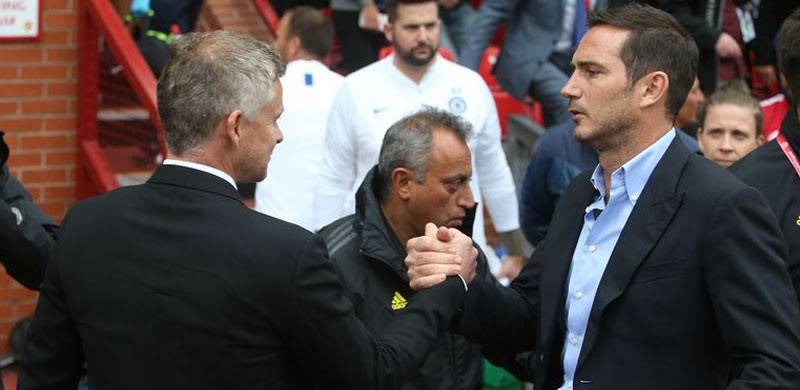
Ismail Farooq analyses the performances of two of the youngest managers in English Premier League, Ole Gunnar Solskjaer and Frank Lampard, currently in charge of the two most successful Premier League clubs, who between them have won the competition 18 times. He believes that Lampard's Chelsea have done way better than Ole's Manchester United during the recent months, and he gives concrete facts to back up his argument.
After Manchester United’s 2-0 defeat to league leaders Liverpool on 19th January, there was much debate in the Sky Sports studio about United and who exactly was to blame for their incredible fall from grace in recent years.
Jamie Carragher pointed the finger at Manchester United’s manager, Ole Gunnar Solskjaer. Roy Keane, former player and captain of the club in question, was perplexed as to why his old teammate was being thrown under the bus. He felt it was unfair for people to call for Solskjaer’s head since these same people were suggesting it was important to give Frank Lampard, Chelsea’s new young manager, more time. Keane felt that both Solskjaer and Lampard were in the same boat and needed to be analysed in the same way.
Basic logic does dictate that similar situations or events should be dealt with and examined similarly. Are Solskjaer and Lampard in a similar situation and undergoing similar events, though? Are they, like Keane says, in the same boat?
At the risk of coming across like I am writing an article that is addressing Roy Keane directly, I will attempt to compare and contrast two of the youngest and most inexperienced managers in the Premier League who are currently in charge of the two most successful Premier League clubs, who between them have won the competition 18 times.
After 24 games played in the season, it seems like a reasonable time to assess the two managers and how their teams have been faring so far. Both sides have faced the other 19 teams in the league, the dreaded winter/festive period is over, and enough time has passed to carry out analysis that is representative of the two sides’ seasons so far and the issues that they are facing.
Ole Gunnar Solskjaer and Frank Lampard have certain obvious similarities. To ignore or invalidate them would be wrong. The most obvious one is that both of them have legendary status at their respective former clubs. Lampard is widely accepted as Chelsea’s greatest ever midfielder, while Solskjaer cemented his place in Manchester United folklore when he scored in that 1999 comeback against Bayern Munich.
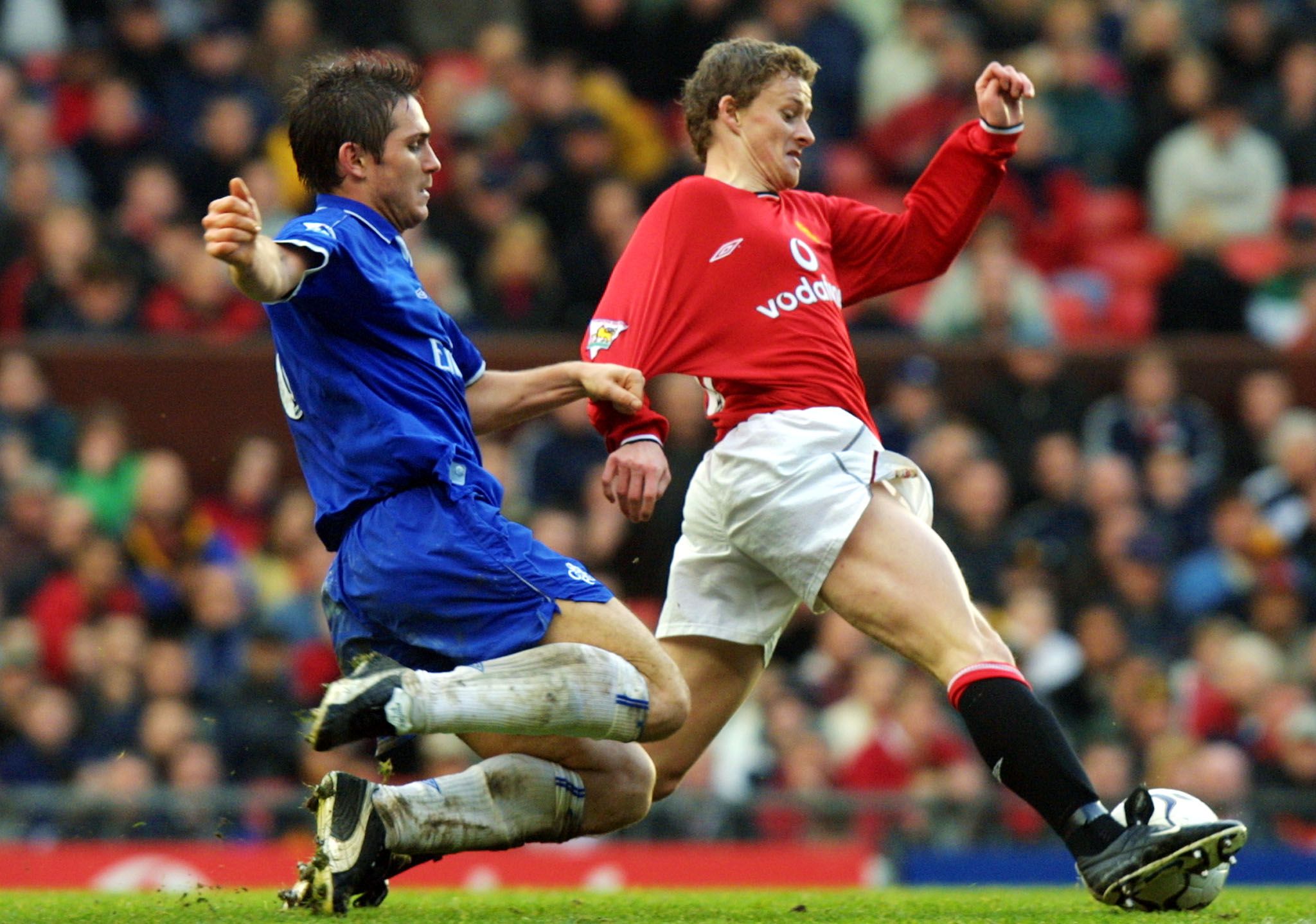
Even in their managerial careers, the two have shared characteristics. Both had some minor managerial experiences before taking on their current jobs - Solskjaer had a brief stint at Cardiff City before going to Molde FK in Norway, whereas Lampard managed Derby County for his first and only season in management before joining Chelsea.
Maybe it has something to do with their youth and inexperience, but both Solskjaer and Lampard are going through somewhat similar difficulties with their clubs.
Consistency is an overarching issue. A league season’s success rests on regularity, determination and the ability to remain as stable as possible. It is very much a marathon, not a sprint. Chelsea and Manchester United have struggled with all of the aforementioned traits this season.
Lampard’s side have gone to tough teams like Wolves and Tottenham and beaten them convincingly in their own backyards, only to lose at home to lacklustre opposition like Bournemouth. United put in their best performances of the season against Tottenham and current champions Manchester City, but they were bookended by draws at home to Aston Villa and Everton. This four match fixture run serves as an accurate microcosm of their whole season.
The problem of inconsistency is not occurring in isolation. It is linked to a trend that both managers are experiencing. Their sides cannot break down teams that sit back and play deep in their own half. Whenever the onus is on their sides to dictate proceedings and be proactive and inventive to find a breakthrough, they come up short. This is why United have lost to the likes of Crystal Palace, West Ham, Newcastle United, Watford and Bournemouth. Open up Chelsea’s league defeats this season and most of the same names pop up.
Debating whether inconsistency drives poor performances against weaker opposition or vice versa is largely a “chicken and egg” problem. Regardless of which one serves as the instigator, both Chelsea and Manchester United are facing both problems right now.
This is broadly where the similarities end and, upon further inspection, the differences start to appear.
Yes, both Solskjaer and Lampard have more or less a similar amount of managerial experience, but the quality of experience is starkly different. Frank Lampard’s singular season as first-team coach before joining Chelsea was in the Championship at Derby County in 2018/19. Lampard guided the team to a sixth-placed finish, enough to secure a place in the Championship Play-Offs but not enough to win promotion to the Premier League.
Lampard, despite having a good and resourceful squad, did his best to promote and polish exciting young talent like Tammy Abraham, Fikayo Tomori and Mason Mount; all three of them had their breakthrough seasons under Lampard at Derby. The Englishman’s side also took some big scalps during that season, winning at Old Trafford and beating Marcelo Bielsa’s excellent Leeds United side in the Championship Play Offs. Lampard’s underlying numbers were concerning though, with his side posting xG numbers of a mid-table team (source: Infogol).
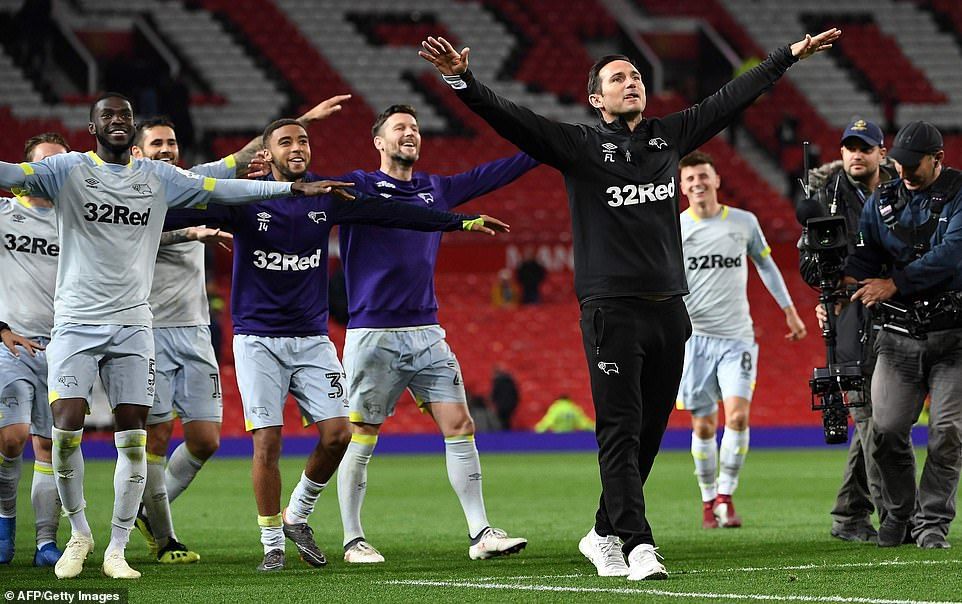
Meanwhile, Solskjaer’s time at Cardiff City was a torrid one, with the club getting relegated from the Premier League first and then being one of the worst clubs in the Championship at the start of the following season. The Norwegian managed 25 official games for Cardiff, winning five, drawing five and losing 15. His win percentage was 20 percent. Even for a club like Cardiff, which is mostly focused on getting promoted to the Premier League and staying in it, that percentage is well below par.
The current Manchester United manager experienced success at Molde FK, a club in the Tippeligaen, which is the Norwegian league. That stint needs to be put into context though, since the Norwegian league is one of the poorest top-flight leagues in Europe. Bleacher Report published a power ranking for European leagues, placing the Tippeligaen in 25th position.
If we move on from previous managerial experiences, current on-the-job performance serves up some big differences between the two. On the face of it, things may seem broadly similar. Chelsea are in the fourth position with 40 points while United are fifth with 34 points, and Chelsea have a really tricky run of games in the coming weeks.
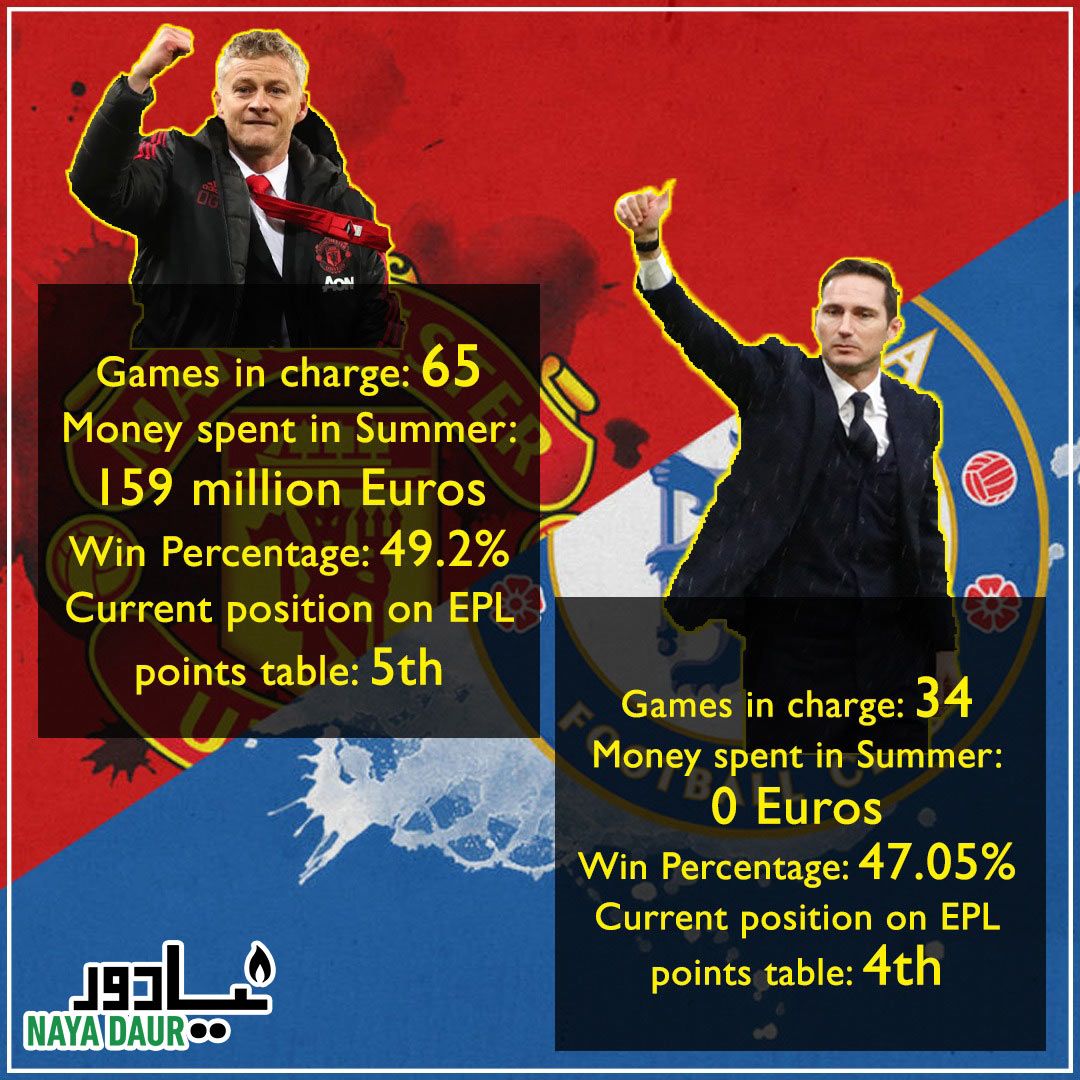
But in reality, things are quite dissimilar, and the huge difference in the moods around the two clubs is a testament to that. One is in a situation where, in the most recent match, tens of thousands of fans walked out of the stadium with a quarter of the game still to go. The other is currently unified in its support for the manager and the team.
The former has largely been triggered by certain trends in the last year or so that have eventually built up aggression and anger and led to this extreme explosion of disgust and resignation. One such trend can be summed up by the fact that, since March 2019, when Ole Gunnar Solskjaer was made permanent manager of Manchester United, the club has lost more league games than it has won. It is at its lowest ever points tally at this stage of a Premier League season.
Since Solskjaer’s permanent appointment in March, Burnley have won more games in the league than Manchester United. He has won 11 league games, drawn nine and lost 12 as permanent manager of United, which gives him a win percentage of 34 percent. How bad that number is, needs no explaining.
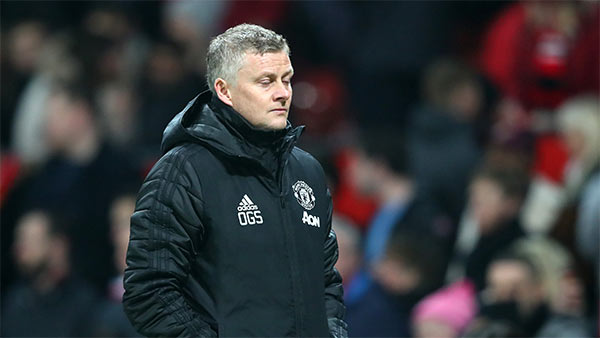
And this is where things start to separate and isolate the Norwegian away from Lampard and into his own lonely cubicle. Ole Gunnar Solskjaer has been at Man United as a manager since December 2018. Worryingly, things have only gotten worse with time. And even more worrying is the fact that Solskjaer is asking for even more that very thing: time.
Over a year of his reign has already passed but we have seen no attacking patterns being coached, no new tactics being introduced in order to evolve the team into a more potent force against teams that “park the bus.” All they are good at is sitting deep themselves and hitting other teams on the counter, which is the easiest way to set up in football. But that approach only works against teams that are better than you on paper, of which there are few.
In Lampard’s case, he has been at Chelsea for far less longer, but already has shown that he is an extremely intelligent and astute individual who is willing to learn and evolve along the way. In pure results terms, he has won 12 league games, drawn four and lost eight, with a win percentage of 50 percent.
We have also seen instances of Lampard setting his team up in a certain way to hurt a specific opposition, like he did with his 3-4-3 formation against Spurs. That was a tactical win by Lampard over his master, Mourinho, and led Chelsea to a 2-0 victory. Against Arsenal a few days later, Lampard tried to use the same game-plan. In this case, it backfired and Arsenal started controlling the game because of their numerical superiority in midfield. Lampard quickly realised his error and made a first-half substitution, bringing on Jorginho. It completely changed the complexion of the match.
People might point to the fact that United are still fifth in the table and have a proper chance of securing top four, but the reality of the situation is this: the only reason the club is anywhere near fourth spot right now is because all its other top four rivals (Chelsea, Arsenal and Tottenham) are also struggling or are in transition. United are closer to the relegation spots than they are to second-placed Manchester City.
Just how tight the league table is from fourth to 14th place can be seen by the fact that only ten points separate those two positions that are ten places apart. Clubs like Wolves and Southampton hitting their strides at the exact time that United are struggling to get a proper footing means things could get even worse very quickly.
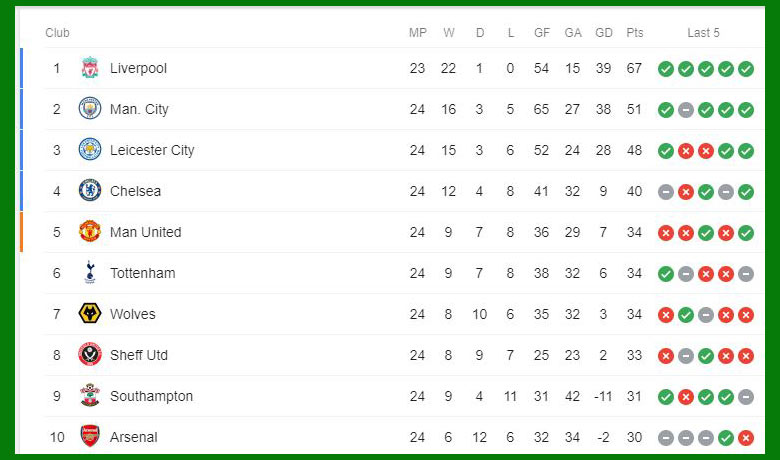
Plus, it is important to realise that Manchester United are currently the highest revenue-generating club in England, and the third highest in the world (source: Deloitte Football Money League). They also had the highest wage bill in England in the last few seasons, even more than the uber-rich Manchester City. With that sort of financial might and resources, it would take a historic car-crash of a season to see them get even fewer points than they currently have.
Essentially, this is also the core difference between Solskjaer and Lampard. Apart from not having the financial might and resources that United have, Chelsea also have not had any sort of investment into the squad at all this season. While United and Solskjaer outspent every single club in the league last summer, allocating most of it to the world’s most expensive defender in Harry Maguire, Lampard and Chelsea spent zero pounds on permanent transfers thanks to Chelsea’s summer transfer ban.
Not only did Lampard not have any sort of room to tweak his squad, he also inherited a squad that was weaker than United’s on paper, certainly in attack and defence. With less, he has been able to do much more, both in tangible terms and otherwise, and with less time. Meanwhile Solskjaer is taking United fans on a journey of resetting expectations that would make Roy Hodgson proud.
I have expressed my thoughts on club legends becoming managers before so I will not repeat myself, but it is truly astonishing to see superclubs willing to hand over the wheel to (managerially) inexperienced former players. Their main learning can only be done on-the-job through mistakes and improvements while virtually no one has any clue about their actual abilities and how good they really are.
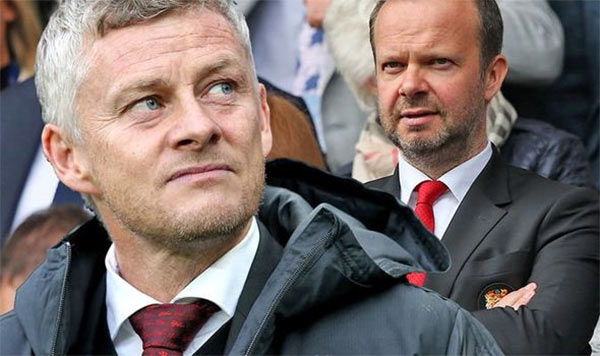
As for Solskjaer, the general discourse is that he is not the problem at United and that it is down to Ed Woodward and the Glazers, the club’s owners. I cannot stress this enough: it is not an either/or problem. Ed Woodward might be the long-term problem at Manchester United, but the biggest issue they have right now is having a manager who is clearly out of his depth and regressing with time.
On Roy Keane’s point about treating him similarly to Frank Lampard, I do not agree at all. The minor similarities they share cannot cloud the glaring and fundamental differences that separate their cases entirely.
After Manchester United’s 2-0 defeat to league leaders Liverpool on 19th January, there was much debate in the Sky Sports studio about United and who exactly was to blame for their incredible fall from grace in recent years.
Jamie Carragher pointed the finger at Manchester United’s manager, Ole Gunnar Solskjaer. Roy Keane, former player and captain of the club in question, was perplexed as to why his old teammate was being thrown under the bus. He felt it was unfair for people to call for Solskjaer’s head since these same people were suggesting it was important to give Frank Lampard, Chelsea’s new young manager, more time. Keane felt that both Solskjaer and Lampard were in the same boat and needed to be analysed in the same way.
Basic logic does dictate that similar situations or events should be dealt with and examined similarly. Are Solskjaer and Lampard in a similar situation and undergoing similar events, though? Are they, like Keane says, in the same boat?
At the risk of coming across like I am writing an article that is addressing Roy Keane directly, I will attempt to compare and contrast two of the youngest and most inexperienced managers in the Premier League who are currently in charge of the two most successful Premier League clubs, who between them have won the competition 18 times.
After 24 games played in the season, it seems like a reasonable time to assess the two managers and how their teams have been faring so far. Both sides have faced the other 19 teams in the league, the dreaded winter/festive period is over, and enough time has passed to carry out analysis that is representative of the two sides’ seasons so far and the issues that they are facing.
Ole Gunnar Solskjaer and Frank Lampard have certain obvious similarities. To ignore or invalidate them would be wrong. The most obvious one is that both of them have legendary status at their respective former clubs. Lampard is widely accepted as Chelsea’s greatest ever midfielder, while Solskjaer cemented his place in Manchester United folklore when he scored in that 1999 comeback against Bayern Munich.

Even in their managerial careers, the two have shared characteristics. Both had some minor managerial experiences before taking on their current jobs - Solskjaer had a brief stint at Cardiff City before going to Molde FK in Norway, whereas Lampard managed Derby County for his first and only season in management before joining Chelsea.
Maybe it has something to do with their youth and inexperience, but both Solskjaer and Lampard are going through somewhat similar difficulties with their clubs.
Consistency is an overarching issue. A league season’s success rests on regularity, determination and the ability to remain as stable as possible. It is very much a marathon, not a sprint. Chelsea and Manchester United have struggled with all of the aforementioned traits this season.
Lampard’s side have gone to tough teams like Wolves and Tottenham and beaten them convincingly in their own backyards, only to lose at home to lacklustre opposition like Bournemouth. United put in their best performances of the season against Tottenham and current champions Manchester City, but they were bookended by draws at home to Aston Villa and Everton. This four match fixture run serves as an accurate microcosm of their whole season.
The problem of inconsistency is not occurring in isolation. It is linked to a trend that both managers are experiencing. Their sides cannot break down teams that sit back and play deep in their own half. Whenever the onus is on their sides to dictate proceedings and be proactive and inventive to find a breakthrough, they come up short. This is why United have lost to the likes of Crystal Palace, West Ham, Newcastle United, Watford and Bournemouth. Open up Chelsea’s league defeats this season and most of the same names pop up.
Debating whether inconsistency drives poor performances against weaker opposition or vice versa is largely a “chicken and egg” problem. Regardless of which one serves as the instigator, both Chelsea and Manchester United are facing both problems right now.
This is broadly where the similarities end and, upon further inspection, the differences start to appear.
Yes, both Solskjaer and Lampard have more or less a similar amount of managerial experience, but the quality of experience is starkly different. Frank Lampard’s singular season as first-team coach before joining Chelsea was in the Championship at Derby County in 2018/19. Lampard guided the team to a sixth-placed finish, enough to secure a place in the Championship Play-Offs but not enough to win promotion to the Premier League.
Lampard, despite having a good and resourceful squad, did his best to promote and polish exciting young talent like Tammy Abraham, Fikayo Tomori and Mason Mount; all three of them had their breakthrough seasons under Lampard at Derby. The Englishman’s side also took some big scalps during that season, winning at Old Trafford and beating Marcelo Bielsa’s excellent Leeds United side in the Championship Play Offs. Lampard’s underlying numbers were concerning though, with his side posting xG numbers of a mid-table team (source: Infogol).

Meanwhile, Solskjaer’s time at Cardiff City was a torrid one, with the club getting relegated from the Premier League first and then being one of the worst clubs in the Championship at the start of the following season. The Norwegian managed 25 official games for Cardiff, winning five, drawing five and losing 15. His win percentage was 20 percent. Even for a club like Cardiff, which is mostly focused on getting promoted to the Premier League and staying in it, that percentage is well below par.
The current Manchester United manager experienced success at Molde FK, a club in the Tippeligaen, which is the Norwegian league. That stint needs to be put into context though, since the Norwegian league is one of the poorest top-flight leagues in Europe. Bleacher Report published a power ranking for European leagues, placing the Tippeligaen in 25th position.
If we move on from previous managerial experiences, current on-the-job performance serves up some big differences between the two. On the face of it, things may seem broadly similar. Chelsea are in the fourth position with 40 points while United are fifth with 34 points, and Chelsea have a really tricky run of games in the coming weeks.

But in reality, things are quite dissimilar, and the huge difference in the moods around the two clubs is a testament to that. One is in a situation where, in the most recent match, tens of thousands of fans walked out of the stadium with a quarter of the game still to go. The other is currently unified in its support for the manager and the team.
The former has largely been triggered by certain trends in the last year or so that have eventually built up aggression and anger and led to this extreme explosion of disgust and resignation. One such trend can be summed up by the fact that, since March 2019, when Ole Gunnar Solskjaer was made permanent manager of Manchester United, the club has lost more league games than it has won. It is at its lowest ever points tally at this stage of a Premier League season.
Since Solskjaer’s permanent appointment in March, Burnley have won more games in the league than Manchester United. He has won 11 league games, drawn nine and lost 12 as permanent manager of United, which gives him a win percentage of 34 percent. How bad that number is, needs no explaining.

And this is where things start to separate and isolate the Norwegian away from Lampard and into his own lonely cubicle. Ole Gunnar Solskjaer has been at Man United as a manager since December 2018. Worryingly, things have only gotten worse with time. And even more worrying is the fact that Solskjaer is asking for even more that very thing: time.
Over a year of his reign has already passed but we have seen no attacking patterns being coached, no new tactics being introduced in order to evolve the team into a more potent force against teams that “park the bus.” All they are good at is sitting deep themselves and hitting other teams on the counter, which is the easiest way to set up in football. But that approach only works against teams that are better than you on paper, of which there are few.
In Lampard’s case, he has been at Chelsea for far less longer, but already has shown that he is an extremely intelligent and astute individual who is willing to learn and evolve along the way. In pure results terms, he has won 12 league games, drawn four and lost eight, with a win percentage of 50 percent.
We have also seen instances of Lampard setting his team up in a certain way to hurt a specific opposition, like he did with his 3-4-3 formation against Spurs. That was a tactical win by Lampard over his master, Mourinho, and led Chelsea to a 2-0 victory. Against Arsenal a few days later, Lampard tried to use the same game-plan. In this case, it backfired and Arsenal started controlling the game because of their numerical superiority in midfield. Lampard quickly realised his error and made a first-half substitution, bringing on Jorginho. It completely changed the complexion of the match.
People might point to the fact that United are still fifth in the table and have a proper chance of securing top four, but the reality of the situation is this: the only reason the club is anywhere near fourth spot right now is because all its other top four rivals (Chelsea, Arsenal and Tottenham) are also struggling or are in transition. United are closer to the relegation spots than they are to second-placed Manchester City.
Just how tight the league table is from fourth to 14th place can be seen by the fact that only ten points separate those two positions that are ten places apart. Clubs like Wolves and Southampton hitting their strides at the exact time that United are struggling to get a proper footing means things could get even worse very quickly.

EPL Points Table on January 25, 2020
Plus, it is important to realise that Manchester United are currently the highest revenue-generating club in England, and the third highest in the world (source: Deloitte Football Money League). They also had the highest wage bill in England in the last few seasons, even more than the uber-rich Manchester City. With that sort of financial might and resources, it would take a historic car-crash of a season to see them get even fewer points than they currently have.
Essentially, this is also the core difference between Solskjaer and Lampard. Apart from not having the financial might and resources that United have, Chelsea also have not had any sort of investment into the squad at all this season. While United and Solskjaer outspent every single club in the league last summer, allocating most of it to the world’s most expensive defender in Harry Maguire, Lampard and Chelsea spent zero pounds on permanent transfers thanks to Chelsea’s summer transfer ban.
Not only did Lampard not have any sort of room to tweak his squad, he also inherited a squad that was weaker than United’s on paper, certainly in attack and defence. With less, he has been able to do much more, both in tangible terms and otherwise, and with less time. Meanwhile Solskjaer is taking United fans on a journey of resetting expectations that would make Roy Hodgson proud.
I have expressed my thoughts on club legends becoming managers before so I will not repeat myself, but it is truly astonishing to see superclubs willing to hand over the wheel to (managerially) inexperienced former players. Their main learning can only be done on-the-job through mistakes and improvements while virtually no one has any clue about their actual abilities and how good they really are.

As for Solskjaer, the general discourse is that he is not the problem at United and that it is down to Ed Woodward and the Glazers, the club’s owners. I cannot stress this enough: it is not an either/or problem. Ed Woodward might be the long-term problem at Manchester United, but the biggest issue they have right now is having a manager who is clearly out of his depth and regressing with time.
On Roy Keane’s point about treating him similarly to Frank Lampard, I do not agree at all. The minor similarities they share cannot cloud the glaring and fundamental differences that separate their cases entirely.
